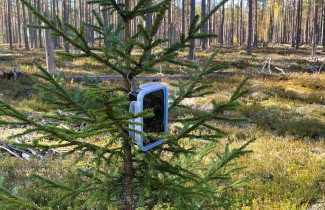The doctoral dissertation in the field of Forest Sciences will be examined at the Faculty of Science, Forestry and Technology, Joensuu Campus.
What is the topic of your doctoral research? Why is it important to study the topic?
In my dissertation, I investigated how the value creation logic of the forest sector is changing when entering the sustainable circular forest-based bioeconomy. I investigated the past, the present and possible future value creation within the Finnish forest sector. It is an important research topic because the current global change drivers, such as sustainability challenges and the increasing importance of knowledge and digitalisation, have tremendous impacts on the global socio-economic system and the business environment of companies. Changes in the business environment create pressures for established sectors, such as the forest sector, to change their networks and value creation logic. Value creation logic describes the established ways and activities by which various actors (e.g., companies, forest owners, politicians and different associations) create together economic, social and environmental value and benefits for themselves, each other and nature.
In the broader picture, in order to respond to the changes, challenges and opportunities brought about by the change drivers, systemic change in the value creation ways is needed. To achieve systemic change, large-scale changes and adjustments to the socio-economic system are required. This requires comprehensive societal changes in the ways how, e.g., energy, food and utility goods are produced and consumed. For systemic change to be sustainable, the new solutions must meet the needs of current generations without compromising the needs of future generations. Transition to a holistically sustainable circular bioeconomy is one proposed systemic change. Holistically sustainable circular bioeconomy is an economic model which aims at creating sustainable well-being for society and nature by using renewable natural resources in a sustainable, resource-efficient, just and circular manner. Systemic change cannot happen without everyone being involved, and the role of business fields and companies is essential.
What are the key findings or observations of your doctoral research?
According to my findings, the value creation logic of the forest sector is incrementally changing towards holistically sustainable, collaborative and cross-sectoral value co-creation logic. The forest sector has been able to change its networks and value creation logic in the past according to the changes in the business environment. It seems that the sector is currently adapting its value creation logic to respond to the economic, environmental and social pressures of the moment. In addition, it seems that the actors in the sector have understood the importance of cross-sectoral collaboration and intangible resources, such as knowledge and competence, in sustainable value-creating activities. Actors have acknowledged that their attitudes and actions will affect the future value creation within the sector.
From the perspective of a sustainable circular bioeconomy, it can be said that economic, environmental and social sustainability has been a significant part of the value creation logic of the sector throughout history, only the foci have varied over time. Economic sustainability related to economic viability of operations and securing access to important resources has always been strongly present. The environmental sustainability has become an important factor due to rising environmental awareness since the 1990s at the latest, and today especially climate change and biodiversity loss have increased its significance as part of sustainable value co-creation. Social sustainability was central, especially until the beginning of the 20th century, when the companies, especially in mill regions, had a significant social role in providing well-being. Today, the social dimension is beginning to gain importance as part of the sector's global activities when the perspectives of local communities and indigenous people are acknowledged. The perceptions and needs of private forest owners are increasingly taken into account in decision-making in Finland.
For the scientific community, the most significant merit of my dissertation concerns the research framework and theoretical foundations of the research. The dynamic and complex business environment is seen as nested and intertwined networks with different layers, starting from individual actors, continuing to focal ecosystems, to the business field and ending with a broader socio-economic-technological system. With this research framework, I have sought to create a holistic understanding of the development of value creation logic and networks in the forest sector, the factors that have influenced them, and what kind of roles different actors have. In addition, the interdisciplinary nature of my dissertation can be considered a significant merit. Combining views from different disciplines, especially how the sustainability transition affects the strategic and network management of companies, has been a little researched, but an emerging research trend in forest science research.
How can the results of your doctoral research be utilised in practice?
For the general public and from the practical, especially from business management and political decision-making point of view the results can be used to redefine the forest sector and develop new holistically sustainable business models. For the forest sector to respond to the challenges and opportunities presented by the change drivers, the understanding of forests and their use should be widened. First, the forest and the tangible and intangible resources it provides should be considered as a whole. The forest is a significant natural ecosystem providing a variety of tangible, such as wood and berries, and intangible, such as carbon sequestration, climate regulation and recreational values, resources for humans and nature to utilise.
From a business point of view, the forest and the resources it provides should also be seen as capital with what various actors create value and benefits together for the common good for humans and nature. Second, the understanding of the forest sector and related business fields should be expanded to include not only traditional wood-based industries, but also other business fields using wood and non-wood resources, such as the medical, food, natural products, nature tourism and textile industries. Changing the logic of thinking, actions and value creation, so that forest comes first, is the key to achieving holistic sustainability. The value co-creation between different actors is a key factor in enabling the new wider forest sector and its different actors to be proactive forerunners of the sustainability transition. And here, cross-sectoral, networked, holistically sustainable and just business models are crucial.
What are the key research methods and materials used in your doctoral research?
The research strategy of the dissertation was an interdisciplinary theory-guided qualitative case study. In my research, I utilised perspectives and concepts from strategic management, network management and transition studies, as well as psychological theories of behavioural change. My doctoral dissertation is interdisciplinary because I approached my research topic by combining perspectives from different disciplines and applying them to research in forest economics.
My research methods and materials were qualitative with the aim to gain an in-depth understanding of the research topic. I analysed and interpreted scientific and non-scientific documents and their contents to determine the past and currently occurring adaptations within the forest industry’s value creation logic. I conducted semi-structured and theme interviews to identify the possible future value creation logic of forestry service providers and the attitudes and readiness of forest owners to change their forest management in order to respond to changes in the business environment. Finally, I reflected my findings to the forest sector.
The doctoral dissertation of Anu Laakkonen, MSc, entitled On the reconfiguring value creation logic and networks of the forest sector in a changing business environment will be examined at the Faculty of Science, Forestry and Technology, Joensuu Campus. The opponent will Professor Robert Kozak, The University of British Columbia, and the custos will be Professor Jouni Pykäläinen, University of Eastern Finland. Language of the public defence is English.
For more information, please contact:
Anu Laakkonen, anu.laakkonen@uef.fi




